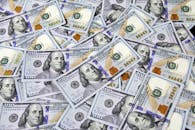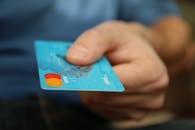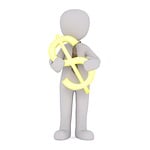Vocabulary: Banking and money
This is a list of vocabulary items related to banking
Banking and money vocabulary
ATM
abbreviation of Automated Teller Machine: a machine, usually in a wall outside a bank, from which you can take money out of your bank account using a special card.
bank balance
the amount of money in a bank account.
I’d like to check my bank balance, please.
bank charges
sums of money paid by a customer for a bank’s services.
bank statement
a printed record of the money put into and removed from a bank account
bounce
when a check cannot be paid or accepted by a bank because of a lack of money in the account:
I had to pay a penalty fee when my check bounced.
cash
(noun) money in the form of notes and coins, rather than checks or credit cards:
Do you have any cash on you?
cash a check/cheque
(verb) to exchange a check for cash:
Would you cash a check for me?
checkbook (US) / chequebook (UK)
a book of checks / cheques with your name printed on them which is given to you by your bank to make payments with.
check (US) / cheque (UK)
a printed form, used instead of money, to make payments from your bank account:
I wrote him a check for $100.
credit
1. money in your bank account.
I was relieved to see from my statement that my account was in credit
2. a method of paying for goods or services at a later time, usually paying interest as well as the original money.
They decided to buy the car on credit.
credit card
a small plastic card which can be used as a method of payment, the money being taken from you at a later time.
checking account (US) / current account (UK)
a bank account that you can take money from at any time and which usually earns little or no interest.
debit
(a record of) money taken out of a bank account.
The account was in debit at the end of the month (= more money had been spent than was in the account at that time).
debt
money, which is owed to someone else, or the state of owing something:
He managed to pay off his debts in two years.
The firm ran up huge debts.
deposit (US) / pay in (UK)
to put money into a bank account.
If you go to the bank, will you deposit these checks for me?
direct debit
an arrangement for making payments, usually to an organization, in which your bank moves money from your account into the organization’s account at regular times:
I pay my electricity bill by direct debit.
expense
when you spend or use money.
Buying a bigger car has proved to be well worth the expense.
We’ve just had a new garage built at great expense.
insurance
an agreement in which you pay a company money and they pay your costs if you have an accident, injury, etc:
life/health/car/travel insurance
interest
1. money which is charged by a bank or other financial organization for borrowing money.
I got a loan with an interest rate of 10%.
2. money that you earn from keeping your money in an account in a bank or other financial organization.
You should put the money in a savings account where it will earn interest.
loan
a sum of money which is borrowed, often from a bank, and has to be paid back, usually together with an additional amount of money that you have to pay as a charge for borrowing.
She’s trying to get a $100 000 loan to start her own business.
NSF
Non Sufficient Fund
overdraft
The act of overdrawing a bank account.
payee
a person who money is paid to or should be paid to.
savings account (US) / deposit account (UK)
a bank account in which you usually leave money for a long time and which pays you interest.
standing account (UK)
an instruction to a bank to pay a particular amount of money at regular times from a person’s bank account to another bank account (compare direct debit)
tax
(an amount of) money paid to the government, which is based on your income or of the cost of goods or services you have bought:
They’re putting up the tax on cigarettes.
traveler’s check
a piece of paper that you buy from a bank or a travel company and that you can use as money or exchange for the local money of the country you visit
withdraw
to take money out of a bank account.
Banking idiomatic expressions
Can I bank on your support?
A fool and his money are soon parted.
A company or an activity which is a licence to print money.
The company has been coining it/money since the new manager took over.
Since he’s in the money, he’s extremely generous to his friends.
Ice cream sellers are minting money thanks to the heat.
Most people think being a professional footballer is money for jam.
That costs an arm and a leg.
I got it for a song.
Time is money.
More money idioms with explanations and examples
Rich and poor
Describing a rich or a poor person:
Rich:
stinking rich, flush, well-heeled, loaded, moneyed, well-to-do, filthy rich, rolling in it, wealthy, prosperous, affluent, well off, …
Poor:
dirt poor, hard up, needy, skint, broke, penniless, moneyless, poverty-stricken, empty-handed, deprived, unfortunate, underprivileged, meager, reduced, pitiable, humble, lowly, modest, destitute…
Related materials:
Idioms about money and business
Public Debt
Economic recession
The Great Depression
Banking vocabulary
Vocabulary about economic recession
What is another word for Money in the bank?
-
savings
cash reserve, saved money
-
nest egg
provision for future, cash reserve
-
security
money saved
-
hoard
provision for future
-
accumulation
provision for future
-
stockpile
provision for future, saved money
-
cache
provision for future, saved money
-
savings account
saved money
-
stash
saved money
-
reserve fund
-
funds
-
revenue
cash reserve
-
backing
cash reserve
-
money
cash reserve
-
nut
-
currency
-
dough
-
proceeds
-
wealth
-
treasure
-
earnings
-
scratch
-
bread
-
affluence
-
store
-
collateral
-
finance
-
lucre
-
means
-
capital
Use filters to view other words, we have 174 synonyms for money in the bank.
Filters
Filter synonyms by Letter
A B C D E F G H I J K L M N O P Q R S T U V W Y
Filter by Part of speech
noun
phrase
Suggest
If you know synonyms for Money in the bank, then you can share it or put your rating in listed similar words.
Suggest synonym
Menu
Money in the bank Thesaurus
Money in the bank Antonyms
External Links
Other usefull source with synonyms of this word:
Synonym.tech
Thesaurus.com
Photo search results for Money in the bank






Image search results for Money in the bank






Cite this Source
- APA
- MLA
- CMS
Synonyms for Money in the bank. (2016). Retrieved 2023, April 14, from https://thesaurus.plus/synonyms/money_in_the_bank
Synonyms for Money in the bank. N.p., 2016. Web. 14 Apr. 2023. <https://thesaurus.plus/synonyms/money_in_the_bank>.
Synonyms for Money in the bank. 2016. Accessed April 14, 2023. https://thesaurus.plus/synonyms/money_in_the_bank.
The electric company is in the process of building a new power plant. There is some uncertainty regarding the size of the plant to be built. If the community that the plant will service attracts a large number of industries, the demand for electricity will be high. If commercial establishments (offices and retail stores) are attracted, demand will be moderate. If neither industries nor commercial stores locate in the community, the electricity demand will be low. The company can build a small, medium, or large plant, but if the plant is too small, the company will incur extra costs. The total costs (in $millions) of all options are shown in the accompanying table.
| Size of Plant | Size of Plant | Size of Plant | |
|---|---|---|---|
| Electricity Demand | Small | Medium | Large |
| Low | 220 | 300 | 350 |
| Moderate | 330 | 320 | 350 |
| High | 440 | 390 | 350 |
The following probabilities are assigned to the electricity demand:
| Demand | P (Demand) |
|---|---|
| Low | .15.15 |
| Moderate | .55.55 |
| High | .30.30 |
Calculate the expected opportunity loss for each decision, and determine the optimal decision.
- Learn English
- Online English Lessons -Speak English Fluently
- How to Learn English the Bespeaking Way
- Why Learn Online?
- Language Courses
- English One-on-One Lessons
- English Group Lessons
- Job and University Applicants
- English Language Tests and Certificates
- Online IB and Proofreading
- Professional Proofreading and Correction
- Our Teachers
- English Teachers
- German Teachers
- French Teachers
- Spanish Teachers
- Italian Teachers
- Persian Teachers
- Portuguese Teachers
- Chinese Teachers
- Blog
- Easy English
- Learning English
- Vocabulary
- Conversation / Small Talk
- Business
- Culture
- Grammar
- Loan Words
- Newsletter Sign-up
- Pricing
- Contact Us
Banking English Vocabulary
-
View Larger Image
For better or worse (whether it’s good or bad), technology has made it almost completely unnecessary for us to physically go to a bank these days. Most banking can be done online or at an ATM. In fact, I think the last time I physically entered a bank and spoke to a teller (the person who works at the bank) was four years ago when I set up my German account. However, banking is still an essential (key, very important) part of day-to-day life, so it’s important to know some banking English vocabulary.
Whether you handle all your accounts online, still balance a checkbook, or like to go inside a bank to speak with a real person, here are some essential banking English phrases.
Withdraw money/ Make a Withdrawal
When you go to an ATM, the machine will usually ask you what you would like to do and present (give, offer) you with a few options. You can do things like check how much money you have in your account (your personal amount of money), deposit (put in) money, or withdraw (take out) money by making a withdrawal.
Don’t be scared off (intimidated, afraid) by the word withdrawal…it’s even tricky for me to say! Withdraw simply means to take out money out of an account. Who doesn’t like holding some cold, hard, cash?
Save
Do you make enough money to put some away at the end of the month? Then you might want to save some of it. Saving money means putting some money aside (on the side) for when you may need it at a future point in time. This is such an essential banking English term, that we even have a great idiom for this in English: putting money aside for a rainy day.
To save money, people usually have a separate savings account to keep that money separate from their general spending money (money you use regularly to pay for things). Watching your savings account grow each month is a great feeling, so if you think it’s time to open a savings account, you definitely should!
Deposit money/make a deposit
A deposit is pretty much (basically, in essence, in principle) the opposite of a withdrawal. A deposit is when you or an employer puts money into your bank account, instead of taking it out.
I like to deposit the change I’ve collected into my savings account every few months. It’s a great, little way to save some extra money!
Interest
Interest is one of my favorite parts of a savings account, and least favorite parts of a credit card. When you open a bank account, they will generally have a small amount of interest attached, meaning that the bank will pay you a little bit of money, a fixed percent, each month to incentivize (reward, pay) you to keep your account open. It’s never much money, but it’s always nice to see my money growing month by month.
Interest on something like a loan (money you borrow from the bank) or a credit card is a fixed percentage charged to you (that you have to pay the bank) each month for borrowing money.
This is part of how banks make money: by charging you a fixed percentage of interest for borrowing money they are borrowing from other customers. So, a customer puts money in the bank and the bank gives the customer a percentage of interest for allowing the bank to use their money. In turn, the bank uses that money to give to other people in the form of a loan and charges the borrower a higher interest rate for using the money. This way the bank can pay interest to their customers with the interest they charge the borrowers. Make sense?
Interest on a loan can make things like student loans difficult to pay off, as you end up paying back a lot of interest.
Deduct
To deduct is quite similar to withdraw, but slightly different. When something is deducted from your account, it is subtracted from it. A deduction is usually something like an automatic payment set up to be removed from your account each month, a payment at a restaurant, etc. These are listed clearly on your bank statement/ bank summary.
Direct Deposit
Does your employer (the place you work) pay your salary (the money you earn) directly into your bank account each month? Then you have a direct deposit set up.
Direct deposit is exactly what it sounds like: it’s when a certain amount is deposited into your bank account directly, without the need for a middleman to handle the transaction. The day the direct deposit clears (transfers, goes through) is the best day of the month!
Remuneration
Have you ever heard of anyone paying remunerations? Remuneration is a scary sounding banking English word, but it’s really just a fancy word for a payment (normally money) in exchange for work or a service. So, when that direct deposit clears, you’re getting your remuneration from your employer.
Set up an account
This is perhaps one of the most important banking English phrases when it comes to your personal banking, as you won’t get very far without a bank account. When you are just starting out as a young person, move to a new country or state, or feel it’s finally time to switch banks, you’ll have to go into a bank and tell them that you would like to set up or open an account.
Happy banking!
Buy Lessons
Can you come up with any example sentences of your own? Share them with us in the comments below!
Did you like this blog? Share it with others! Let us know what YOU think!
Check out these other popular blogs: Taboo words in English, 7 Synonyms for Being Drunk, 7 American English Slang Words, or these Sports Idioms used in English!
Erin Duffin lives in Hamburg, is an English teacher, blogger, yoga instructor, and her favorite part of banking English is when she sees her remuneration directly deposited into her bank account! Whoo hoo! Pay Day!
Looking for more phrases, ways to use English everyday, or get the conversation started? Sign up for our newsletter or check out the website!
Crystal Fisher2023-02-03T11:56:48+01:00
Share This!
Related Posts
Page load link

In this article, you will find a list of useful Money and Banking Vocabulary in English. Here is a list of the most common Money and Banking words and phrases such as Bank Balance, Bank Accounts, Bank statements, Cash-back, Cheque, Credit Rating, Current Account, Direct Debit, Interest, Loan, and more.
Money and Banking Vocabulary in English
- Bank Balance – the amount of money you have in your Bank Account.
- Bank Account – place in a Bank where you can put your money.
- Bank Charges – money paid by you for a bank’s services.
- Bank Draft – to pay someone that is sent from one bank to another bank.
- Bank Statement – a document that shows the money put into and removed from a bank account.
- Bank Branch – Bank building where you can go to do your banking.
- Bounce – check cannot be paid by a bank because of a lack of money.
- Borrower – someone who borrows money from a bank. One of the most common money and banking vocabulary words.
- Cardholder – someone who owns a bank card.
- Cash-back – This is money from your Bank Account that you can take out when you use your Bank Card to pay for things in a shops.
- Cheque – This is a a printed form that you can fill in to pay money to people.
- Credit – an amount of money that you add to an bank account.
- Credit card – a bank card which can be used as a method of payment.
- Credit Limit – the maximum amount of money that a you can borrow using a credit card account.
- Credit Rating – financial information about you that a bank uses for deciding whether to give you credit.
- Current Account – a bank account that you can take money from at any time and which usually earns little or no interest. One of the most used money and banking vocabulary words.
- Customer Adviser – This is the person at the Bank who can help you.
- Debit – money taken out of a bank account.
- Debit Card – a bank card that lets you take out cash, pay in money and pay for things that you buy in a shop.
- Deposit – put money into a bank account.
- Direct Debit – an arrangement for making payments in which your bank moves money from your account into the organization’s account at regular times.
- Fee – A Bank fee – money that the Bank can take from your Bank Account if you ask the Bank to do something special for you.
- Interest – Money which is charged by a bank for using the banks money or money given to depositors for the use of their money by the bank.
- Loan – when the Bank lends you some money which you then pay back, plus some interest. One of the most common money and banking vocabulary words.
- Mortgage – a special type of loan from a Bank in order to buy a house. One of the most common money and banking vocabulary words.
- Overdraft – When the amount of money withdrawn from a bank account is greater than the amount actually available in the account
- Overdrawn – you have spent more money than is in your bank Account.
- Passbook – A book in which are recorded all deposits, withdrawals, and earnings of a customer’s savings account.
- Paying-in book/Paying-in slip – a piece of paper you can use to pay money into your Bank Account.
- Safe Deposit Box – secured container for safe-keeping of your valuables under high degree of security and confidentiality.
- Sort Code – e special number for your Bank.
- Standing Order – when the Bank takes out particular amount of money from your Bank Account each month to pay someone or organization that you tell it to.
- Transaction – when you take out or put money into your bank account.
- Withdrawal – to take money out of a bank account. One of the most common money and banking vocabulary words.
Marin Valchev, PMP is an IT Project Manager with more than 10 years of experience. He implements cutting-edge technology in a wide-range of Financial and TELCO companies in Europe, Asia, and Africa. Marin shares his knowledge of software, analysis, project management and other business areas.





